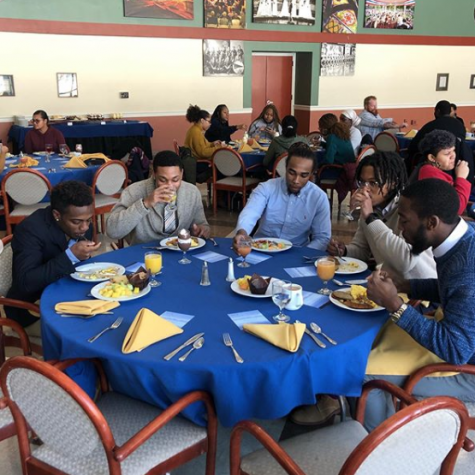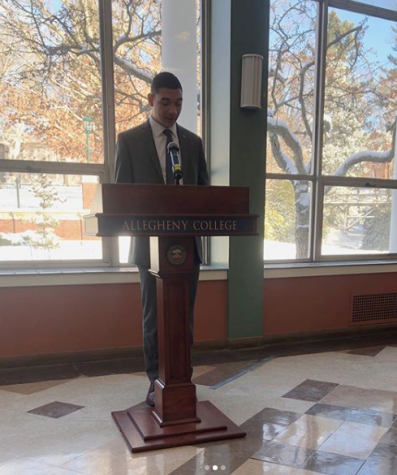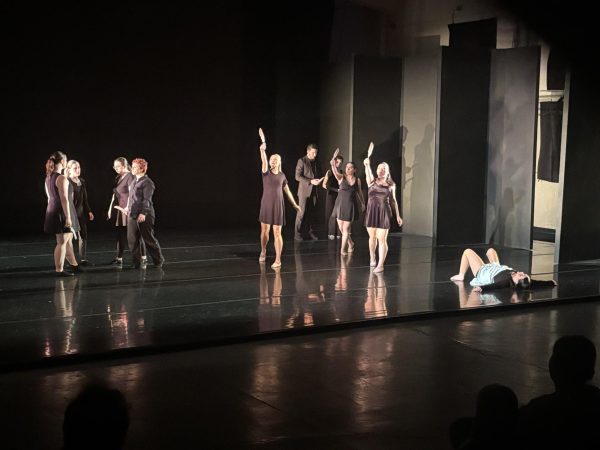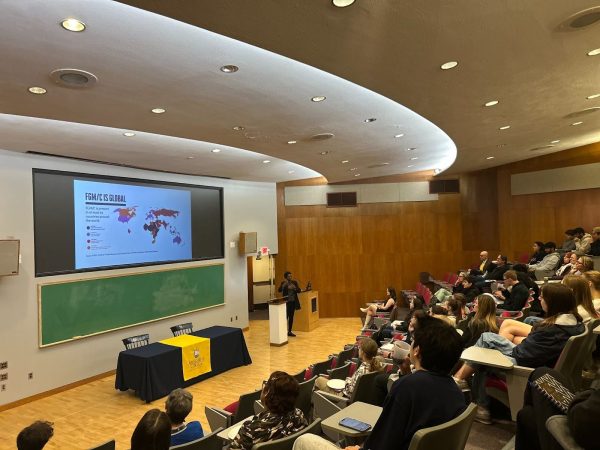MOCAA strives to make Allegheny feel like home

Members of MOCAA enjoy food at the Martin Luther King, Jr. Day “CommUNITY” Brunch held on
Monday, Jan. 20, 2020 in Schultz Banquet Hall.
Black History Month is coming to an end, but the work of student organizations on campus that made much of the month-long programming at Allegheny possible is not. One of those groups, the Men of Color Advancement Association (MOCAA), is hoping to provide both an intimate support network and a wide-reaching sense of community.
“Our main goal is to raise the retention rate for men of color on this campus through philanthropy, community service, as well as academic development, as well as professional development, stuff like that,” said Charles Ross, ’20, club president. “We just want to give brothers a chance to build communities, build themselves up, and have a sense of self-worth on a campus that we’re not really seen like that. We want to increase the retention and make students of color feel comfortable here.”
To build community on campus, MOCAA hosts multiple on-campus events. The group contributed to the Black History Month programming organized by Advancement of Black Culture (ABC) by hosting weekly movie nights on Thursdays throughout the month of February. In January, MOCAA organized a brunch in honor of Martin Luther King, Jr. and invited members of the Meadville community.
Members of MOCAA also work together with Kappa Kappa Gamma to host an annual Christmas Sweater Party raising money for Toys for Tots.
“We try to work out with historically white fraternities and sororities and stuff like that because we really want to build these relationships,” Ross said. “We want them to be meaningful.”
Other recent events have included a talk on safe sex practices, a LinkedIn workshop and a salon and barber shop event organized in conjunction with Black Girl Magic.
Outside of their formal programming, the group also provides outreach in informal settings. Ross said the group implements “an open-door policy” in his apartment, inviting “brothers” to come by to study, play games or simply spend time with other members of the group.
This openness is an effort, according to group member Jacob LeSane, ’22, to fill a void many students of color find upon arrival in Meadville.
“At a predominantly white institution, in an area where most of the Meadville area is white, and the surrounding towns are white people, when you leave campus a lot of people say that they don’t see a lot of black people,” LeSane said. “They really don’t have a sense of connection with the town.”
That lack of diversity, according to Treasurer Cameron Schadl, ’21, can have further implications for students of color. He said he and many other students of color come from far away and can feel like they lack “necessary tools” or the “same comfort” they enjoyed in other environments.
“With us at MOCAA, I see it as something where we’re letting people know that MOCAA is a safe space,” Schadl said. “We’re letting them know that here at Allegheny, there are tools and resources that they can use and be comfortable here. It’s a home away from home.”
That safe space can sometimes take the form of day-to-day concerns like finding a place for haircuts and hair products, according to Ross.
“It’s just little things, and life, and we’re trying to make it easier for young brothers on campus,” Ross said.
Ross, Schadl and LeSane each said they joined because they were drawn to the community MOCAA provided. Ross recalled seeing MOCAA’s first graduating class, made up of five members from its 2016 founding, graduate in May of 2019.
“I saw the value and merit of a program like MOCAA,” Ross said, commenting on the growth to an anticipated seven-person graduating class this May. “It just keeps going. It’s really cool to see.”
LeSane said he saw that value and merit in particular during the Martin Luther King, Jr. brunch, in which Ross was a guest speaker and he witnessed the support group members provided for him.

MOCAA President Charles Ross, ’20, speaks at the Martin Luther King, Jr. Day “CommUNITY” Brunch held on
Monday, Jan. 20, 2020 in Schultz Banquet Hall.
“It’s not like you’re left out,” LeSane said. “There’s always a community.”
One of Schadl’s favorite events MOCAA holds is the annual Christmas party with Kappa Kappa Gamma and the opportunity it provides for different groups to interact in ways they might otherwise never have done.
Ross said this exemplifies a key tenet of MOCAA.
“I think that’s something really cool about our organization,” Ross said. “We try to be as expansive as possible. We just don’t work with the (Culture, Identity, & Leadership Coalition) organizations.”
He said the group hopes to continue being expansive in the future.
“We just want to be here for people,” Ross said. “I think that’s our long term goal is just being here, having a sense of ontology.”
LeSane emphasized the necessity of a student-run source of support.
“With minorities on campus, a lot of the times they say, and I can understand where they’re coming from, that they don’t have anyone to go to besides like the (Inclusion, Diversity, Equity, Access, and Social Justice) Center and certain places like that,” LeSane said. “They need more people to go to and connect with, and it’s easier to connect with fellow classmates and stuff like that. I would just make sure that they know that they can come to us.”
The group members said students interested in learning more can reach out either directly to Ross via email or via the group’s pages on Instagram and Facebook.
Olivia Blakeslee is a senior majoring in English with a minor in journalism in the public interest. This is her fourth year on staff, and she is serving...






